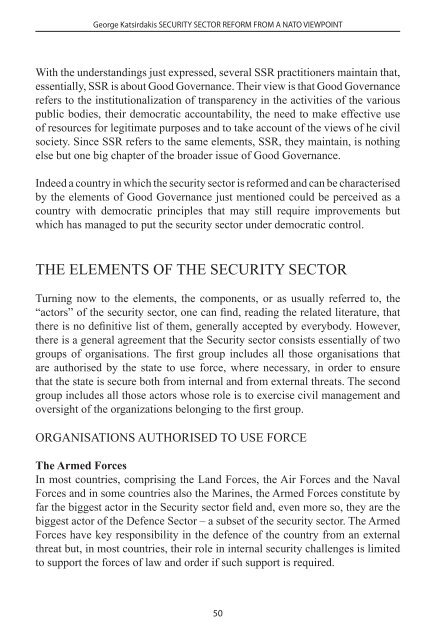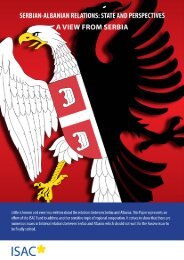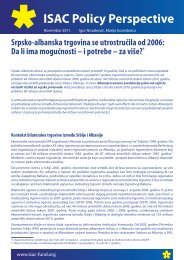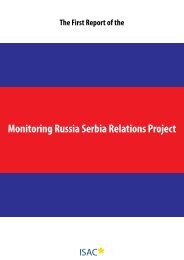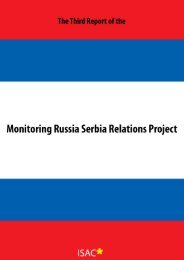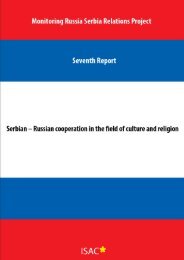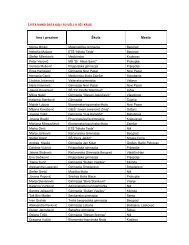the process of security sector reform - ISAC Fund
the process of security sector reform - ISAC Fund
the process of security sector reform - ISAC Fund
You also want an ePaper? Increase the reach of your titles
YUMPU automatically turns print PDFs into web optimized ePapers that Google loves.
George Katsirdakis SECURITY SECTOR REFORM FROM A NATO VIEWPOINT<br />
George Katsirdakis SECURITY SECTOR REFORM FROM A NATO VIEWPOINT<br />
With <strong>the</strong> understandings just expressed, several SSR practitioners maintain that,<br />
essentially, SSR is about Good Governance. Their view is that Good Governance<br />
refers to <strong>the</strong> institutionalization <strong>of</strong> transparency in <strong>the</strong> activities <strong>of</strong> <strong>the</strong> various<br />
public bodies, <strong>the</strong>ir democratic accountability, <strong>the</strong> need to make effective use<br />
<strong>of</strong> resources for legitimate purposes and to take account <strong>of</strong> <strong>the</strong> views <strong>of</strong> he civil<br />
society. Since SSR refers to <strong>the</strong> same elements, SSR, <strong>the</strong>y maintain, is nothing<br />
else but one big chapter <strong>of</strong> <strong>the</strong> broader issue <strong>of</strong> Good Governance.<br />
Indeed a country in which <strong>the</strong> <strong>security</strong> <strong>sector</strong> is <strong>reform</strong>ed and can be characterised<br />
by <strong>the</strong> elements <strong>of</strong> Good Governance just mentioned could be perceived as a<br />
country with democratic principles that may still require improvements but<br />
which has managed to put <strong>the</strong> <strong>security</strong> <strong>sector</strong> under democratic control.<br />
THE ELEMENTS OF THE SECURITY SECTOR<br />
Turning now to <strong>the</strong> elements, <strong>the</strong> components, or as usually referred to, <strong>the</strong><br />
“actors” <strong>of</strong> <strong>the</strong> <strong>security</strong> <strong>sector</strong>, one can find, reading <strong>the</strong> related literature, that<br />
<strong>the</strong>re is no definitive list <strong>of</strong> <strong>the</strong>m, generally accepted by everybody. However,<br />
<strong>the</strong>re is a general agreement that <strong>the</strong> Security <strong>sector</strong> consists essentially <strong>of</strong> two<br />
groups <strong>of</strong> organisations. The first group includes all those organisations that<br />
are authorised by <strong>the</strong> state to use force, where necessary, in order to ensure<br />
that <strong>the</strong> state is secure both from internal and from external threats. The second<br />
group includes all those actors whose role is to exercise civil management and<br />
oversight <strong>of</strong> <strong>the</strong> organizations belonging to <strong>the</strong> first group.<br />
ORGANISATIONS AUTHORISED TO USE FORCE<br />
The Armed Forces<br />
In most countries, comprising <strong>the</strong> Land Forces, <strong>the</strong> Air Forces and <strong>the</strong> Naval<br />
Forces and in some countries also <strong>the</strong> Marines, <strong>the</strong> Armed Forces constitute by<br />
far <strong>the</strong> biggest actor in <strong>the</strong> Security <strong>sector</strong> field and, even more so, <strong>the</strong>y are <strong>the</strong><br />
biggest actor <strong>of</strong> <strong>the</strong> Defence Sector – a subset <strong>of</strong> <strong>the</strong> <strong>security</strong> <strong>sector</strong>. The Armed<br />
Forces have key responsibility in <strong>the</strong> defence <strong>of</strong> <strong>the</strong> country from an external<br />
threat but, in most countries, <strong>the</strong>ir role in internal <strong>security</strong> challenges is limited<br />
to support <strong>the</strong> forces <strong>of</strong> law and order if such support is required.<br />
In particular, <strong>the</strong> Armed Forces, because <strong>of</strong> <strong>the</strong>ir size, organisation, training,<br />
capabilities and equipment, can deal very effectively with an external organised,<br />
relatively large force which threatens <strong>the</strong> sovereignty, <strong>the</strong> territorial integrity<br />
and <strong>the</strong> <strong>security</strong> <strong>of</strong> <strong>the</strong> country.<br />
If, however, <strong>the</strong> external threat comes from small groups, like terrorists, traffickers,<br />
organised crime and similar sources, <strong>the</strong> Armed Forces may not be <strong>the</strong> right actor<br />
to deal with such threats. Although <strong>the</strong> Armed Forces could still support <strong>the</strong> effort<br />
<strong>of</strong> o<strong>the</strong>r state authorities by <strong>of</strong>fering intelligence support, support through <strong>the</strong> use<br />
<strong>of</strong> sophisticated equipment normally not available to <strong>the</strong> forces <strong>of</strong> law and order<br />
or <strong>of</strong> border <strong>security</strong>, and possibly also with <strong>the</strong> formation <strong>of</strong> special mixed task<br />
forces with military and law and order forces, <strong>the</strong> key role in <strong>the</strong> case <strong>of</strong> such<br />
threats is entrusted to <strong>the</strong> law and order forces.<br />
In <strong>the</strong> case <strong>of</strong> internal <strong>security</strong> threats <strong>of</strong> limited scale, <strong>the</strong> main responsibility<br />
lies normally with <strong>the</strong> forces <strong>of</strong> law and order while, like in <strong>the</strong> previous case,<br />
<strong>the</strong> Armed Forces may be called to support <strong>the</strong> effort.<br />
In case, however, <strong>the</strong> internal threat is <strong>of</strong> a massive nature, like in <strong>the</strong> case <strong>of</strong> large<br />
scale violence, rebellion or secessionist activity, <strong>the</strong>n again it is <strong>the</strong> responsibility<br />
<strong>of</strong> <strong>the</strong> Armed Forces to deal with <strong>the</strong> problem closely assisted by <strong>the</strong> forces <strong>of</strong><br />
internal <strong>security</strong> and law and order. In a democratic society, if such an emergency<br />
appears that <strong>the</strong> use <strong>of</strong> <strong>the</strong> Armed Forces is considered indispensable, <strong>the</strong> expectation<br />
is, that as soon as <strong>the</strong> situation appears to be manageable by <strong>the</strong> internal<br />
<strong>security</strong> and law and order forces, <strong>the</strong> Armed Forces will return to <strong>the</strong>ir barracks<br />
leaving <strong>the</strong> control <strong>of</strong> <strong>the</strong> situation to <strong>the</strong> appropriate internal <strong>security</strong> forces.<br />
They could still provide support to <strong>the</strong> internal <strong>security</strong> forces but <strong>the</strong>y should not<br />
be in charge <strong>of</strong> <strong>the</strong> situation <strong>the</strong>mselves.<br />
Usually, one more case where <strong>the</strong> Armed Forces may have an important role in<br />
internal emergencies may be <strong>the</strong> case <strong>of</strong> large natural or technological disasters<br />
where <strong>the</strong>y can provide assistance to <strong>the</strong> population and protect <strong>the</strong>m from danger<br />
since <strong>the</strong> resources <strong>of</strong> <strong>the</strong> Armed Forces are more adapted to cases <strong>of</strong> massive<br />
disasters than those <strong>of</strong> <strong>the</strong> forces <strong>of</strong> internal <strong>security</strong>. In such cases though, <strong>the</strong><br />
activity <strong>of</strong> <strong>the</strong> Armed Forces should be closely coordinated with that <strong>of</strong> <strong>the</strong> forces<br />
<strong>of</strong> internal <strong>security</strong>, <strong>the</strong> forces <strong>of</strong> law and order, <strong>the</strong> humanitarian agencies and<br />
o<strong>the</strong>r bodies that could be activated in such emergencies. These emergencies are<br />
50 51


